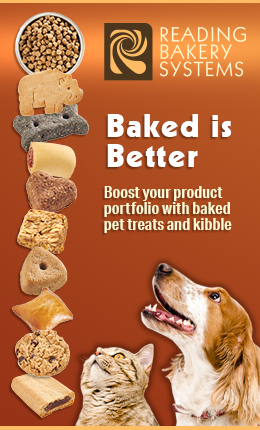Flexible Plastic Packaging is a favored material for Pet Food and treat Companies, providing longer freshness, durability, and easy product viewing for the consumer. Yet plastic packaging accounts for up to 20% of the environmental impact of a pet food or treat product. The Natural Dog Company, a Pet Sustainability Accredited business, is addressing the impact of its plastic packaging in three ways: plastic neutral certification, use of #4 plastics and recycling product tags returned by customers.
We've known for a long time that plastic has been piling up in the oceans and causing problems, but it wasn't until we heard that it's projected that by the year 2050 we'll have more plastic in the ocean than fish, that it really hit home for us. At that point we knew, as The Natural Dog Company really wanted to be part of the solution to Ocean Plastic rather than being a company that is adding to it. Dan Goodnow, CEO, The Natural Dog Company.
Plastic Neutral Program Removes Equivalent Plastic Created
The Natural Dog Company partners with rePurpose Global, a company that manages the world's first plastic credit platform. On their website, the company notes that for every pound of plastic the company produces, an equivalent amount of plastic is removed from the environment. The Natural Dog Company pays rePurpose Global a fee, based on the weight of plastics it produces. RePurpose Global then finances projects that remove plastic waste from oceans – a project selected by The Natural Dog Company.
RePurpose notes that plastic neutral certification is an excellent first step to combat plastic waste, and companies can do so for less than .1% of sales revenue.
Working with rePurpose Global was great. The team was very thorough with their research, transparent about how everything would work and answered all of our questions. We feel really fortunate to be able to work with them to get this project off the ground.' Dan Goodnow.
Switching to #4 plastic for all Packaging
The Natural Dog Company also switched all of its plastic packaging to #4 plastic. 100% of the company's bags are now #4 LDPE (low-density polyethylene). The bags display the #4 LDPE logo, which helps some customers understand the opportunity for recycling the bag. The company's website provides links to a #4 plastic bag drop-off location directory.
The Company also encourages its retailers to setup drop-off bins at their pet stores, noting that it will encourage customers to return to the store and buy additional treats for their pets. A recent 'return to retail' pilot collections program demonstrated an increase in store visits.
TagBack Program Recycles Product Tags
The Natural Dog Company produces elastic tags for bulk treats like rawhides. The tags help retailers manage and keep accurate data on their inventory. The product tags are made by Bedford Industries, of Worthington, MN. Bedford Industries manages TagBack, a product and service where they produce tags for businesses and provide collection systems (mail back and in-store) to collect the tags and make them into other reusable materials. Bedford's TagBack services are also widely used for produce.
Actions That Add Up in Reducing Plastic Waste
Individually, each of these three steps was a relatively simple action for the Natural Dog Company to take, mostly involving changing their packaging and tags to readily available materials. Yet together, these actions have a significant impact: the company estimates that these three initiatives remove about 20,500 pounds of plastic annually.
Pet companies have many resources available to help in addressing packaging waste and other social or environmental initiatives. Dan Goodnow, CEO of The Natural Dog Company encourages other pet companies to engage with the Pet Sustainability Coalition in getting help:
The best way for other Pet Food Companies to make a change in their own packaging is to first determine their own company sustainability goals, then talk to PSC about the best way to achieve them! Whether it's reducing carbon footprint, simplifying end-of-life recyclability, or increasing the amount of post consumer recycled content in your bags, the team at PSC has their fingers on the pulse of what's happening in the sustainable packaging sector and can point you in the right direction to take your first steps.
Author: Dan Goodnow
Source: Pet Sustainability Coalition
You could be interested: Greenwashing in pet food: what it is and how to avoid it































